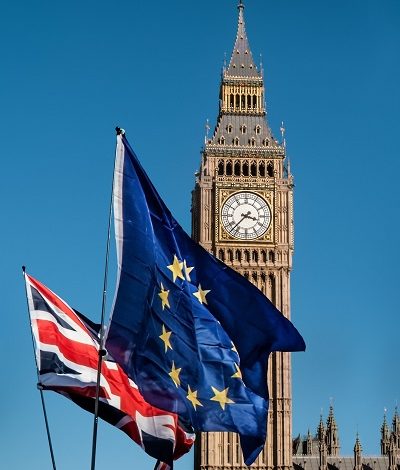
Last Friday, 31st of January 2020, exactly at 23 hours, the United Kingdom officially ceased to be part of the European Union to complete over three-year long Brexit struggle.
Over three years, the entire world has been bombarded with the word ‘Brexit’. Indeed, it has virtually become a household word. It is all about the inevitable decision by the people of Britain leaving the 28-member European Union which they have been leading and formidable member since 1973.
The event was welcomed by the people with mixed feelings as some jubilated all night for the victory in the struggle to divorce the other European countries after 47 years of active membership, others intensified their three-year long anti Brexit protest even though their battle was not won.
From whatever view point, Brexit has brought untold negative consequence to the nation; paramount is the sharp national division. It is a process that has caused the jobs of two Prime Ministers, David Cameron and Theresa May. In monetary terms it has caused the UK billions of Pounds including the 19 billion Pounds annual delay fee.
“Research by Bloomberg Economics estimates that the economic cost of Brexit has already hit 130 billion pounds ($170 billion), with a further 70 billion pounds set to be added by the end of this year. That’s based on the damage caused by the U.K. untethering from its Group of Seven peers over the past three years”
Besides, there comes some further confusion after Brexit as Scotland and Wale also appear to be planning to divorce Britain. At the moment of the exit at 23:00 GMT, “Scotland’s First Minister Nicola Sturgeon tweeted a picture of the EU flag, and stating that “Scotland will return to the heart of Europe as an independent country”, thus launching the hashtag campaign requesting the UK to leave a light on for Scotland –
She has therefore called for a new referendum on her country’s independence describing Brexit as “material change in circumstances”.
In Cardiff, Welsh First Minister Mark Drakeford has also noted that Wales remained in the EU even though it voted to leave the EU in the referendum some three years ago.
Amidst all these, Prime Minister Boris Johnson, has pledged to reunite the people and also set the economy back on track. The question is, was Brexit necessary at all? Experts say, voting to leave the EU was not understood properly by the masses.
For most of them it meant that the Eastern Europeans who had stormed the UK as the results of the global economic downturn in the early part of the decade were perceived as those who were running down the moral fabrics of the society as well as the economy so voting yes in the referendum would halt that. Little did they know that leaving the EU was more than that.
In fact, leaving the EU has severe consequences on almost all spheres of the entire existence of the UK. Brexit has already and will continue to have negative impart on both domestic and external trade, public finances, business, immigration, EU citizens living in the UK, border controls, asylum policy, human right, the impact of immigration in the economy, agriculture, and higher education.
Other areas affected or likely to be affected by Brexit include culture, media and sports, consumer policy, international development, defense, fishing, social security, pensions, health transport, environment, North Ireland, energy and climate change, Wales and Scotland.
In the words of the Prime Minister Johnson, “For many people this is an astonishing moment of hope, a moment they thought would never come and there are many of course who feel a sense of anxiety and loss.”
Obviously, Britain will have to look for new trade and economic partners and also strengthen the already exiting ones outside the EU.
Already some of these including Goldman Sachs Group Inc. “have presented plans to increase the assets held through their Frankfurt subsidiaries tenfold after the U.K.’s exit from the EU to comply with requirements, the people said.” 250 billion euros ($283 billion) is said to be involved in this move.
According to Bloomberg the market movers such as “JPMorgan, Goldman Sachs and Morgan Stanley have all said that they will convert their Frankfurt offices into their EU hubs. Citigroup has chosen Frankfurt as its EU trading hub and recently converted its German legal entity to serve the entire bloc. Bank of America Merrill Lynch has selected Paris as its EU hub” meaning they are moving away from London.
Currently, EU is Britain’s largest biggest trading partner with 45% of the entire UK’s exports go to the EU while 50% of its imports are also from the EU. The single market accounts for 25%, that’s a quarter, of global GDP, making it the second largest in the world.
The “GDP in EU is expected to be 18500.00 USD billion by the end of this quarter, according to Trading Economics global macro models and analysts expectations. In the long-term, the European Union GDP is projected to trend around 19400.00 USD Billion in 2020. This is according to econometric models.”
Britain’s economy has over the years been chiefly depended on market-orientated lines. So therefore, it will need stronger market coalition to develop and sustain its economy, which is the fifth-largest national economy in the world today.
Why would Britain want to leave the EU, the second largest economy to stand on its own for the fifth world position in terms of economy? This may explain the reason why it has started strongly and so early to link up with so many countries especially those outside the EU to saturate the grounds for effective trade activities. The recent Trade and Investment Summit hosted by Prime Minister Johnson is all part of the preparations towards a new chapter of Britain’s trade links.
The choice of Africa and Ghana, for that matter, by the UK after Brexit is highly tipped. It is anticipated that Britain would look at Africa which has enormous and rich natural and human resource to intensify trade and enhance its economic activity.
Whiles Britain has a choice in trade relations, the choice by Ghana for EU or UK during this post-Brexit era would be crucial in relations to Ghana’s future economic partnership and development.
The UK is making all efforts to strengthen its post-Brexit trade and investment in Africa and Ghana, for that matter, as a continent that hosts some of the fastest growing economies in the world.
Undoubtedly, Africa appears to be very important market for small firms, and as the continent continues to grow, business links will no doubt increase with it. The issue also is that the entire African continent accounts for just 3 per cent of all UK goods and services exports. By contrast, Europe takes the lion’s share of about 50 percent of UK trade.
The reason for Britain’s weak trade links with Africa is not far-fetched. France, Germany and Italy — all EU members — export more than double the value of goods to the continent than the UK, according to the International Trade Centre. Even Spain, which has an economy half the size of the UK’s, exports more than Britain.
We all may recall that the UK’s trade presence in Africa was not always this small until the late-1990s. Britain accounted for nearly 7 per cent of the continent’s imports. Now that share has dropped to just over 2 percent but the UK government appears optimistic that it can change this. As the prime minister announced during her speech in South Africa, “the UK’s ambition is to be the G7’s number one investor in Africa by 2022,”
So therefore, the big question is can UK trade with Africa start to fill the gap left by Brexit?
By Nana Sifa Twum




